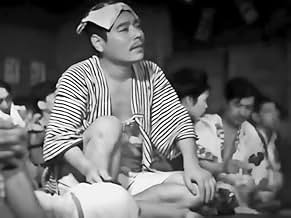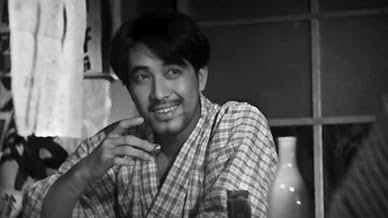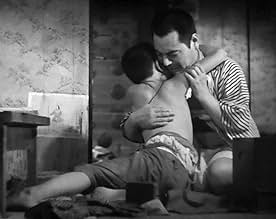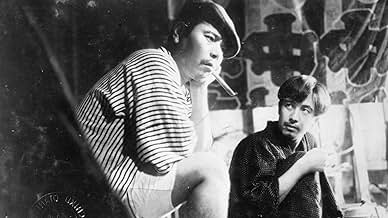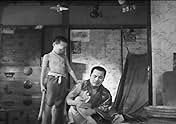CALIFICACIÓN DE IMDb
7.2/10
1.5 k
TU CALIFICACIÓN
Dos compañeros de trabajo de Tokio encuentran a joven que busca un lugar donde vivir.Dos compañeros de trabajo de Tokio encuentran a joven que busca un lugar donde vivir.Dos compañeros de trabajo de Tokio encuentran a joven que busca un lugar donde vivir.
- Dirección
- Guionistas
- Elenco
- Premios
- 1 premio ganado en total
Den Ôhinata
- Jiro
- (as Den Obinata)
Tomio Aoki
- Tomio
- (as Tokkan Kozô)
Chishû Ryû
- Man on boat
- (sin créditos)
Hideo Sugawara
- Boy Taunting Tomio
- (sin créditos)
- Dirección
- Guionistas
- Todo el elenco y el equipo
- Producción, taquilla y más en IMDbPro
Opinión destacada
(1933) Passing Fancy/ Dekigokoro
SILENT DRAMA
Co-written and directed by Yasujirô Ozu that opens with a group of people sitting around listening to the speaker talking about the latest news. By the time it was over, the movie then focuses on the single father, Kihachi Kimura (Takeshi Sakamoto) his son, Tomio Kimura (Tomio Aoki) who is on the third grade; his best friend and neighbor, Jiro (Den Obinata) and the old lady, Otome (Chôko Iida) who kind of lives with them. When one day, a young lady, Harue (Nobuko Fushimi) who dresses like a geisha is wondering around homeless, with Kihachi taking her under his wing. We then learn more about them and their daily lives. For instance, Kihachi and his best friend, Jiro both work in a factory and do not enjoy it, and that Tomio consistently have to wake them up every morning to go to work, in which they sometimes often show up late.
The movie starts out routinely, and it did not become interesting until the father, Kihachi began arguing with his son, Tomio. The argument regards that his dad is not the most ideal father because he does not know how to read, and that he often drinks at the bar after he comes home. In other words, he is often an embarrassment to his only son. And the more I know more about the father, the more I wanted to know about what happened to his wife, which could be anything! Or what was his wife like, and how come she is not with him anymore- how did she ever put up with him. The father's life began to intrigue me, and I did not get enough of that as much as I hoped. The movie resonates on some areas, while does not work on others, such as the father, beginning to express interest on Harue! For some reason, I almost dozed off, I guess it's a consistent theme when an older man begins to express interest to a younger lady. I also kind of hoped how the father is able to go through his life without reading and writing. Like, can he at least know how to spell his name!
Co-written and directed by Yasujirô Ozu that opens with a group of people sitting around listening to the speaker talking about the latest news. By the time it was over, the movie then focuses on the single father, Kihachi Kimura (Takeshi Sakamoto) his son, Tomio Kimura (Tomio Aoki) who is on the third grade; his best friend and neighbor, Jiro (Den Obinata) and the old lady, Otome (Chôko Iida) who kind of lives with them. When one day, a young lady, Harue (Nobuko Fushimi) who dresses like a geisha is wondering around homeless, with Kihachi taking her under his wing. We then learn more about them and their daily lives. For instance, Kihachi and his best friend, Jiro both work in a factory and do not enjoy it, and that Tomio consistently have to wake them up every morning to go to work, in which they sometimes often show up late.
The movie starts out routinely, and it did not become interesting until the father, Kihachi began arguing with his son, Tomio. The argument regards that his dad is not the most ideal father because he does not know how to read, and that he often drinks at the bar after he comes home. In other words, he is often an embarrassment to his only son. And the more I know more about the father, the more I wanted to know about what happened to his wife, which could be anything! Or what was his wife like, and how come she is not with him anymore- how did she ever put up with him. The father's life began to intrigue me, and I did not get enough of that as much as I hoped. The movie resonates on some areas, while does not work on others, such as the father, beginning to express interest on Harue! For some reason, I almost dozed off, I guess it's a consistent theme when an older man begins to express interest to a younger lady. I also kind of hoped how the father is able to go through his life without reading and writing. Like, can he at least know how to spell his name!
- jordondave-28085
- 10 dic 2023
- Enlace permanente
Argumento
¿Sabías que…?
- TriviaYasujirô Ozu regular Chishû Ryû has a small role towards the end of the film as a fellow passenger on board a ship, playing an uncredited "Man on Boat".
- ErroresKihachi states that 50 sen to a boy his age (referring to Tomio) is like 10 ryo to him and Otome. The ryo was replaced by the yen in 1871, over 60 years earlier. (The yen replaced the ryo at par; there are 100 sen to the yen.)
However, Otome then says, "No, more like 1,000 yen!" So, it's possible "ryo" was still being used synonymously with "yen" over a half-century later.
- ConexionesFeatured in Transcendental Style and Flatulence (2017)
Selecciones populares
Inicia sesión para calificar y agrega a la lista de videos para obtener recomendaciones personalizadas
Detalles
- Tiempo de ejecución1 hora 40 minutos
- Color
- Mezcla de sonido
- Relación de aspecto
- 1.37 : 1
Contribuir a esta página
Sugiere una edición o agrega el contenido que falta

Principales brechas de datos
By what name was Capricho pasajero (1933) officially released in Canada in English?
Responda




